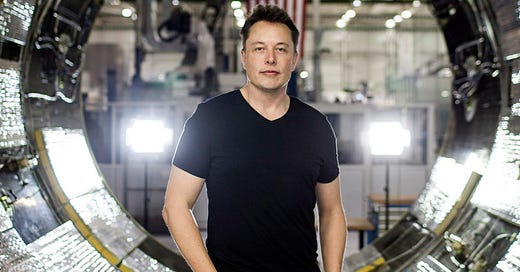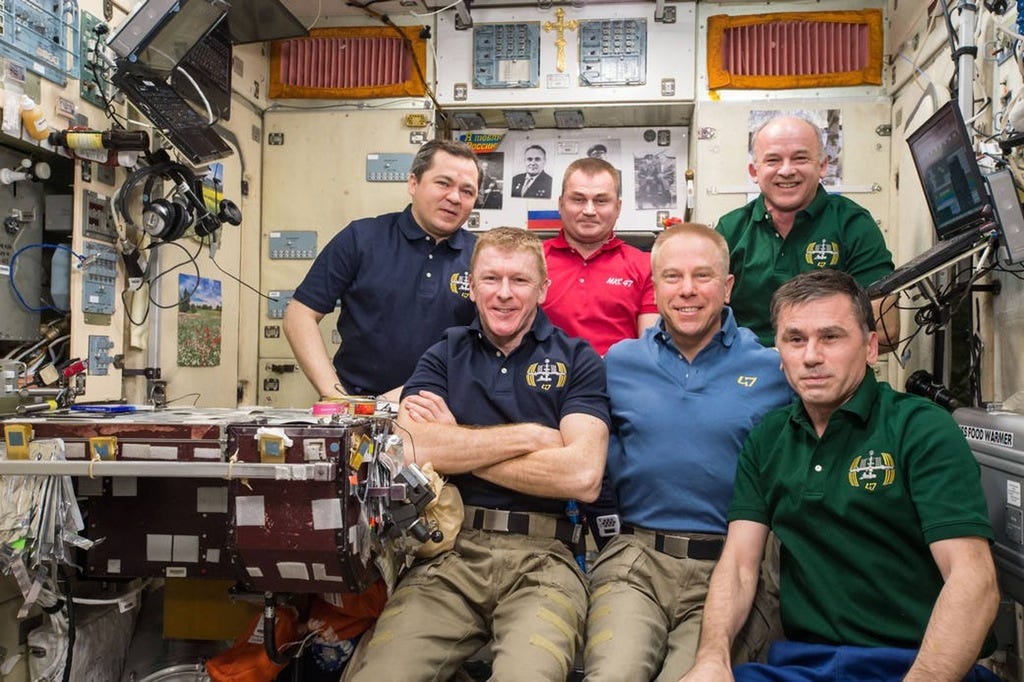Another Essay From A Defunct Blog
Reflections on religion, murder, and the colonisation of space.
Note - This one dates from 2014, I think. Possibly 2015. I wrote at least some of this in a coffee shop in Switzerland - a place advertised as a co-working space, but which I remember as having the acoustics from hell. I have just added the Whitey’s On The Moon video to make the whitey reference a little clearer. Caveat reader; there could be a few typos here. I should point out that when I wrote this, I still liked Elon Musk. I would be a little less gushing now.
The First Murder In Space (And Other Thoughts)
Elon Musk has just revealed his plan to save the human race from extinction by demonstrating a feasible means of colonizing Mars. The plan will likely remain in the realm of sci-fi for some time and I would be cautious on betting on a 2022 start. (For a potted history of missions to Mars see The Martian Chronicles) For now, let´s say things go according to plan and look instead at other short and long-term considerations beyond the economic and technological ones. The rest of this post is food for thought.
It would be nice to see this project successfully launched within the remainder of my lifetime (another 30 or 40 years). Doable, I feel.
The primary spanner in the works of the project to colonize Mars is not technological, it’s biological. Namely, the people that will get on board the rockets sent to get there. Just volunteering at a young age to head to Mars on a one-way trip on what is potentially a giant explosion shortly after launch is a sign that you may be on the wacky end of the spectrum. The irony is not amiss on Elon, who has joking toyed with calling the first of the ships Heart Of Gold. My advice to Elon would be to not be on board the first launch. Now for that concept video again -
MISSING VIDEO
Whitey On Mars
Does it matter who colonizes Mars or is it just important that there is a colony of humans? All that counts is survival of the species, right? What if the mission to save mankind ends up as a mission to save a portion of mankind? Would it matter, say, if the first few thousand people on mars were Chinese? What about Russian? American? Arab? Or will there have to be a rigorous selection of representative genetic diversity? Science tells us there is no need - as diversity is almost purely in the eye of the beholder. Evidence is reasonably fair that there is not a huge appreciable difference between people on a genetic level, no matter how different they may look. I suspect that is not a thought that would sit comfortably with anyone if it turned out that the first Martian colonizers were all Europeans - or all Americans.
The thing is, although the planned mission to Mars is not fueled by any sort of crazy eugenics theory - you can be certain that someone will cry foul if the mission turned out to have a disproportionate number of members of one particular ethnic background. Not that there is any good evidence that this will occur; to gather sufficient numbers of volunteers to make a series of one-way missions to Mars viable, will mean spreading the net far and wide. Even without the numerical necessity to spread the net, there will be political pressure to ensure that as a wide range of ethnic backgrounds will be represented on the mission. And there will be political pressure of other sorts too.
Mars, God Of War
One of the defining features of colonization to date has been how central the role of religion has been. Lets hope this is the one mission that does not require God on our side. How, when you have a limited selection of people willing to go on a one way mission to Mars, can you ensure that they are all atheists - or at least, deeply, deeply agnostic? That will be tough. And if they are not atheists will the different religious factions manage to be able to live and work alongside each other?
Looking to the international space station may help. The number of ISS astronauts is not huge. What might be significant is that on one of the most ultra selective missions that our species has ever embarked on - with a total of just 103 long term residents on rotating missions - at least some of the residents have already brought religious iconography on board. Approximately 20%. Mainly from the Russian camp. Multiply the numbers by a magnitude and Mars will quickly have its first religious congregation - and in time, perhaps its first religion-based conflict.
Say that it’s not possible to secure a crew and passengers/colonists solely composed of atheists, will the god-fearing colonists of Mars require churches and chapels - or can we have the kind of multi-faith rooms that can now be found in airports etc.
Will Christians require crucifixes to be placed around the place? And how do you turn to Mecca from far side of Mars? Just a few of the more basic questions that religion drags in its wake. But then again, if there is a strict atheist-only policy - once more, another selection criteria whittles down the numbers.
Perhaps it’s worth it. Ask yourself, if we do not opt for hardcore atheists - typically what kind of person has been proven to be predisposed to one-way flights? And who are the people that gather on the tops of hills and skyscrapers awaiting the rapture? You can be certain that there will be a fair number of crackpots vying for a place on a giant rocket to Mars. Do we want the first off-world colony to be defined by religious factions?
Red Scare
Right now Mars is not owned by anyone or any one state. But you can be sure that will change. The reality is whoever pays for the missions, whoever has a majority of citizens from its earth based polities, whoever owns the technology etc - effectively owns Mars. And ownership of countries does not come without issues of diplomacy and worse. What, when we get there, will be the governing system (so to speak) of the red planet - will it be socialist, capitalist, monarchist, republican.... Someone will need to start working on the political reality of running Mars. Preferably before we get there.
Will there be a currency and banking on Mars? Will the colonizers by paid for going to Mars - or could it be that the money that they would earn for going there would be given to remaining families here on earth? (There won´t be much to spend it on on the red planet.) Elon has already hinted that the economy of mars could be based around software development etc.
You might remember that hilarious slip up from a few years ago when a news station inadvertently used the logo of the United Nations Space Command from the Halo game series instead of that t of the United Nations Security Council. You can watch the clip here.
Well, believe it or not there is in fact a body called the United Nations Office for Outer Space Affairs. It was set up in 1958 to tackle the thorn of issue of space and how it might affect the earth. You can learn more at http://www.unoosa.org/ but in meantime here is the history of the organisation -
"The United Nations Office for Outer Space Affairs was initially created as a small expert unit within the United Nations Secretariat to service the ad hoc Committee on the Peaceful Uses of Outer Space, established by the General Assembly in its resolution 1348 (XIII) of 13 December 1958. "
One of the areas of concern of this worthy body is what is called SPACE LAW .
"Space law addresses a variety of matters, such as, for example, the preservation of the space and Earth environment, liability for damages caused by space objects, the settlement of disputes, the rescue of astronauts, the sharing of information about potential dangers in outer space, the use of space-related technologies, and international cooperation. A number of fundamental principles guide the conduct of space activities, including the notion of space as the province of all humankind, the freedom of exploration and use of outer space by all states without discrimination, and the principle of non-appropriation of outer space."
We might wish UNOOSA all the best if hope to expand its remit to cover the goings on on a planet 54.6 million kilometres away from Earth.
Flying around in space blowing stuff up
While I´d like to think the future of space will be about peace and not war - there are good grounds for doubt. Elon might need to consider some other kinds of engineering as this project proceeds - even genetic or medicinal manipulation of the people that will be going on these population missions. Otherwise the risk is that within a few months or within the first year or two into the mission there will be the first murder in space. The first incidents of theft. The first rape etc. Despite Steven Pinker´s recent work, the evidence that man is not a peaceful species is overwhelming; staggering in fact. Murder is daily occurrence in all societies and on a larger historical scale, the historical equivalent to murder is genocide.
Ten years ago I had brief foray into an online universe called Eve. It was quite an experience, flying or drifting around space to a Jean Michel Jarre style soundtrack. Today the game is played by a massive number of players 24 hours a day, all zipping around in space in real time - buying, selling, building, mining and killing. The following video should give a feeling for what they experience - at least some of the time.
MISSING VIDEO
The video also shows what is wrong with Eve (by my mind anyway) and why I stopped playing. Note how the clip opens with a planetary sunrise but then rapidly descends into tacky hard-rock backing (complete with squealing guitar) to accompany the images of missiles and ships blowing up. Ultimately, Eve is not really about flying around in space; it’s about power, possessions, and war. And that is exactly why people play it. We are a warring species - even when we are just having fun. What could have been a beautiful game about space exploration and cooperation is actually just the Gulf War et al in space.
To make this Martian endeavor work there needs to be a population of peaceful people that can live in confined spaces for a long time. In fact, for the rest of their lives. Or if born there - for their entire life. There may be no way of guaranteeing this without medication or a very, very careful selection of participants. But the more careful the selection of participants the less likely it is that the project will be able to build up the requisite number of colonizers to start with.
The mission to Mars is not an exercise in mimicking the evolution of mankind on Earth, but perhaps it should be an exercise that involves tweaking the evolutionary trajectory of humankind for and on Mars itself and going forward - no matter where we end up. . If the goal is simply to ensure the continued existence of a bickering, warring species that is successfully ruining the very planet that spawned it, you´d have to ask if it’s really worth it.
Conclusion?
Unless Elon also looks very, very deeply into ensuring only the right people end up on those rockets, be sure that somewhere along the line - from the effort to find peace-loving hard-working hippies to the selection of a suitable number of representatives from a sufficient number of regions of planet earth - something will go awry. Elon needs support for the initiative. He is handling the technical side. Now someone needs to look at the biological aspect of the project. It’s time to engineer the right people - starting with education.
The other option - dare I say it- is to make the mission overtly military. Certainly, the military will be the best source of information about what it takes to live in cramped, dangerous conditions on a slender machine that spends a large part of its lifespan submersed in blackness devoid of oxygen - and with no hope of survival for the occupants should anything go wrong. Maybe the same sort of people entrusted with nuclear engines and weapons are precisely the sort of people who should be manning the first flight to Mars.
GS






